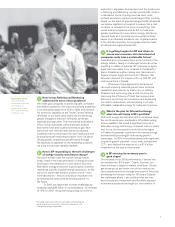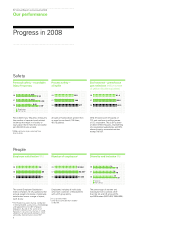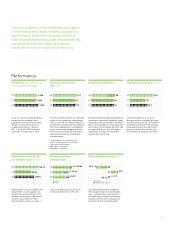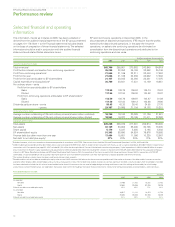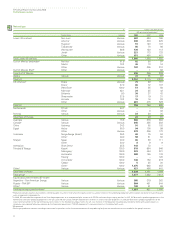BP 2008 Annual Report Download - page 13
Download and view the complete annual report
Please find page 13 of the 2008 BP annual report below. You can navigate through the pages in the report by either clicking on the pages listed below, or by using the keyword search tool below to find specific information within the annual report.
BP Annual Report and Accounts 2008
Performance review
Risk factors
We urge you to consider carefully the risks described below. If any of
these risks occur, our business, financial condition and results of
operations could suffer and the trading price and liquidity of our securities
could decline, in which case you could lose all or part of your investment.
In the current global financial crisis and uncertain economic
environment, certain risks may gain more prominence either individually
or when taken together. Oil and gas prices and margins are likely to
remain lower than in recent times due to reduced demand; the impact of
this situation will also depend on the degree to which producers reduce
production. At the same time, governments will be facing greater
pressure on public finances leading to the risk of increased taxation.
These factors may also lead to intensified competition for market share
and available margin, with consequential potential adverse effects on
volumes. The financial and economic situation may have a negative
impact on third parties with whom we do, or may do, business. Any of
these factors may affect our results of operations, financial condition
and liquidity.
If there is an extended period of constraint in the capital markets,
with debt markets in particular experiencing lack of liquidity, at a time
when cash flows from our business operations may be under pressure,
this may impact our ability to maintain our long-term investment
programme with a consequent effect on our growth rate, and may
impact shareholder returns, including dividends and share buybacks, or
share price. Decreases in the funded levels of our pension plans may also
increase our pension funding requirements.
Our system of risk management provides the response to risks
of group significance through the establishment of standards and other
controls. Inability to identify, assess and respond to risks through this and
other controls could lead to an inability to capture opportunities, threats
materializing, inefficiency and non-compliance with laws and regulations.
The risks are categorized against the following areas: strategic;
compliance and control; and operational.
Strategic risks
Access and renewal
Successful execution of our group plan depends critically on
implementing activities to renew and reposition our portfolio. The
challenges to renewal of our upstream portfolio are growing due to
increasing competition for access to opportunities globally. Lack of
material positions in new markets and/or inability to complete disposals
could result in an inability to grow or even maintain our production.
Prices and markets
Oil, gas and product prices are subject to international supply and
demand. Political developments and the outcome of meetings of OPEC
can particularly affect world supply and oil prices. Previous oil price
increases have resulted in increased fiscal take, cost inflation and more
onerous terms for access to resources. As a result, increased oil prices
may not improve margin performance. In addition to the adverse effect
on revenues, margins and profitability from any fall in oil and natural gas
prices, a prolonged period of low prices or other indicators would lead
to further reviews for impairment of the group’s oil and natural gas
properties. Such reviews would reflect management’s view of long-term
oil and natural gas prices and could result in a charge for impairment that
could have a significant effect on the group’s results of operations in the
period in which it occurs. Rapid material and/or sustained change in oil,
gas and product prices can impact the validity of the assumptions on
which strategic decisions are based and, as a result, the ensuing actions
derived from those decisions may no longer be appropriate. A prolonged
period of low oil prices may impact our ability to maintain our long-term
investment programme with a consequent effect on our growth rate and
may impact shareholder returns, including dividends and share buybacks,
or share price.
Periods of global recession could impact the demand for our products,
the prices at which they can be sold and affect the viability of the
markets in which we operate.
Refining profitability can be volatile, with both periodic oversupply
and supply tightness in various regional markets. Sectors of the
chemicals industry are also subject to fluctuations in supply and demand
within the petrochemicals market, with a consequent effect on prices
and profitability.
Climate change and carbon pricing
Compliance with changes in laws, regulations and obligations relating to
climate change could result in substantial capital expenditure, reduced
profitability from changes in operating costs, and revenue generation
and strategic growth opportunities being impacted.
Socio-political
We have operations in countries where political, economic and social
transition is taking place. Some countries have experienced political
instability, changes to the regulatory environment, expropriation or
nationalization of property, civil strife, strikes, acts of war and
insurrections. Any of these conditions occurring could disrupt or
terminate our operations, causing our development activities to be
curtailed or terminated in these areas or our production to decline and
could cause us to incur additional costs. In particular, our investments in
Russia could be adversely affected by heightened political and economic
environment risks.
We set ourselves high standards of corporate citizenship and
aspire to contribute to a better quality of life through the products and
services we provide. If it is perceived that we are not respecting or
advancing the economic and social progress of the communities in which
we operate, our reputation and shareholder value could be damaged.
Competition
The oil, gas and petrochemicals industries are highly competitive. There is
strong competition, both within the oil and gas industry and with other
industries, in supplying the fuel needs of commerce, industry and the
home. Competition puts pressure on product prices, affects oil products
marketing and requires continuous management focus on reducing unit
costs and improving efficiency. The implementation of group strategy
requires continued technological advances and innovation including
advances in exploration, production, refining, petrochemicals
manufacturing technology and advances in technology related to energy
usage. Our performance could be impeded if competitors developed or
acquired intellectual property rights to technology that we required or if
our innovation lagged the industry.
Investment efficiency
Our organic growth is dependent on creating a portfolio of quality options
and investing in the best options. Ineffective investment selection could
lead to loss of value and higher capital expenditure.
Reserves replacement
Successful execution of our group strategy depends critically on
sustaining long-term reserves replacement. If upstream resources are
not progressed to proved reserves in a timely and efficient manner, we
will be unable to sustain long-term replacement of reserves.
12





